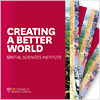The Spatial Sciences Institute (USC Spatial or Institute) in the University of Southern California Dornsife College of Letters, Arts and Sciences (USC Dornsife) has announced the launch of its Geodesign Advisory Board, a group of distinguished leaders who will advise the Institute on its strategic objectives to be a world-class spatial enterprise in a top-ranked research university with academic programs and research in geodesign.
The inaugural members of the USC Spatial Geodesign Advisory Board are:
- Thomas Fisher, Professor, Director of the Minnesota Design Center and Dayton Hudson Chair in Urban Design, University of Minnesota;
- Shannon Heffernan, AICP, Urban Design Manager and Senior Associate, Studio One Eleven;
- Mia Lehrer, FASLA, President and Founder, Studio-MLA;
- Henk J. Scholten, CEO, Geodan, and Professor, Spatial Informatics, Vrije University;
- Carl Steinitz, Professor Emeritus of Landscape Architecture and Planning, Harvard Graduate School of Design and Honorary Professor, Centre for Advanced Spatial Analysis, University College London;
- Eric Wittner, Product Manager, CityEngine and Procedural Technology, Esri;
- Jonathan Woetzel, Director, McKinsey Global Institute (MGI) and Senior Partner, Shanghai, McKinsey & Company;
- Kongjian Yu, FASLA, Changjian Chair Professor, College of Architecture and Landscape, Peking University; International Fellow of The American Academy of Arts and Sciences; and President and Principal Designer, Turenscape.
“We are honored to have these eminent global geodesign leaders advising the Spatial Sciences Institute,” said John P. Wilson, USC professor of sociology and spatial sciences and USC Spatial founding director. “The wide range of their backgrounds from architecture, landscape architecture, urban planning and spatial sciences reflect the interdisciplinarity of the Institute’s geodesign academic programs and research initiatives. Our common intersection is around the power of spatial thinking and the use of spatially infused information and knowledge to tackle global challenges to promote environmental sustainability, public well-being and human security.”
Since its founding in 2010, USC Spatial’s academic programs and research enterprise have been expanding the ability to collect, analyze, model, present and share location–based data, empowering decision makers with spatial thinking and the spatially infused information and knowledge they need to solve vexing challenges. USC Spatial was the first university to offer a B.S. in GeoDesign and a B.S. in Global Geodesign, both of which are ground-breaking undergraduate programs.
The members of the USC Spatial Geodesign Advisory Board will advise on curriculum development, help link its geodesign academic programs to the workforce needs of related industries, and recommend how USC Spatial could strengthen its impact through its geodesign academic, research, and community initiatives.
For more information about USC Spatial and its programs, visit spatial.usc.edu or email Susan Kamei, USC Spatial Managing Director, at kamei@usc.edu.





